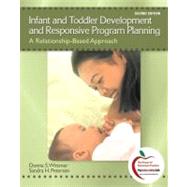
Note: Supplemental materials are not guaranteed with Rental or Used book purchases.
Purchase Benefits
Dr. Donna Wittmer’s Ph.D. is in Child, Family, and Community Studies from Syracuse University where she studied infant and toddler development, behavior, and intervention with Dr. Alice Honig and Dr. Ron Lally (now the creator and coordinator of PITC). Donna Wittmer was a professor of Early Childhood Education at the University of Colorado at Denver and Health Sciences Center for 17 years from 1990-2007. She has taught a variety of courses for students obtaining their MA in Early Childhood Education and a license to teach in Early Childhood Special Education (ages 0-5) and she coordinated the program for eight years. Prior to becoming a professor in Colorado, she taught behavioral pediatrics at the Health Sciences Center in Syracuse for eight years. She also was the coordinator and provided assessment and intervention services, on a grant from New York State, for five years on the Onondaga Nation for children (birth to six) and their families.
She and Sandra Petersen wrote the chapter “Programs for Infants and Toddlers” for S. Feeney, A. Galper, & C. Seefeldt’s book Continuing Issues in Early Childhood Education, Third Edition (Merrill, 2008). She is the author of Focusing on Peers in the Early Years: The Importance of Relationships (In Press, ZERO TO THREE, 2008), and she and Sandra Petersen have written Endless Opportunities for Infant and Toddler Curriculum-A Relationship-Based Approach (Merrill/Pearson, 2009), a companion book to Infant and Toddler Development and Responsive Program Planning . Both Donna Wittmer and Sandra Petersen are authors on The Young Child, 5th Edition with M. Puckett & J. Black (Merrill/Pearson, 2008).
Sandy Petersen works for the Early Head Start National Resource Center at ZERO TO THREE: The National Center for Infants, Toddlers, and Families. She recently worked on the new publication Early Learning Guidelines for Infants and Toddlers: Recommendations for States and the soon to be released second edition of Caring for Infants and Toddlers in Groups: Developmentally Appropriate Practice. She created and teaches the special needs workshop for the WestEd Program for Infant Toddler Care. Before joining ZERO TO THREE, she was Coordinator of Training and Technical Assistance for Early Childhood Initiatives at the Colorado Department of Education. She was one of the primary authors of Colorado’s “Building Blocks”, preschool content standards in reading and mathematics, and the Guidelines for the IFSP and Service Coordination.
Ms. Petersen has direct service experience in early intervention, infant-parent psychotherapy, and childcare. She has a Master’s degree in Educational Psychology and completed doctoral coursework in Early Childhood Special Education at the University of California — Berkeley.
Infant and Toddler Development and Responsive Program Planning and PITC
The authors have both taught for PITC’s national faculty. Their text embraces and captures the PITC language and philosophy and incorporates suggestions for use of the PITC videos throughout a course. You will find many quotes from Dr. Ron Lally in the book. The instructor’s manual recommends specific PITC videos that instructor’s could use when teaching a particular chapter. Ron Lally, creator and coordinator of PITC, wrote a strong recommendation for the textbook.
Both Sandy Petersen and Donna Wittmer are fellows of ZERO-THREE and have written articles for the ZERO to THREE journal. They have presented at national conferences numerous times. During their fellowship years, they studied with Berry Brazelton, Stanley Greenspan, Jeree Pawl, and Dolores Norton.
The authors have been on the faculty of the Colorado Department of Education’s Infant and Toddler Expanding Quality Initiative (EQI) for approximately eight years. The model is a trainer of trainer’s model. The faculty of the EQI has taught over 100 Colorado community teachers/coaches to use a 48 clock-hour course developed by the faculty to train 3000 infant/toddler caregivers to provide responsive and relationship-based care to infants and toddlers. Donna Wittmer, with Sandy Petersen and other faculty members, has created the RELATE–A Self-Reflection and Coaching Tool for Relationship-Based Practice that is used by the community teachers to coach the infant/toddler caregivers.
| A Relationship-Based Model and the Importance of the Infant and Toddler Years | |
| Infants, Toddlers, and Their Families | |
| Understanding and Using Theories | |
| The Power of Observation | |
| Prenatal, Birth, and Brain Development | |
| Attachment and Emotional Relationships | |
| Social Development and Learning with Peers | |
| Cognitive Development and Learning | |
| Language Development and Learning | |
| Motor Development and Learning | |
| Responsive Programs: Quality, Health, Safety, and Nutrition | |
| Creating a Relationship-Based Curriculum | |
| Routines, Environments, and Opportunities: Day to Day the Relationship Way | |
| Respect, Reflect, and Relate: The 3 R Approach to Guidance | |
| Including Infants and Toddlers with Disabilities in Child Development and Education Programs | |
| The Infant-Toddler Professional: Identity, Relationships, and Resources | |
| Portraits of Infants and Toddlers | |
| Developmental Trends (Spanish) | |
| Portraits of Development (Spanish) | |
| The Rights of the Child | |
| Planning Guides | |
| Table of Contents provided by Publisher. All Rights Reserved. |
The New copy of this book will include any supplemental materials advertised. Please check the title of the book to determine if it should include any access cards, study guides, lab manuals, CDs, etc.
The Used, Rental and eBook copies of this book are not guaranteed to include any supplemental materials. Typically, only the book itself is included. This is true even if the title states it includes any access cards, study guides, lab manuals, CDs, etc.